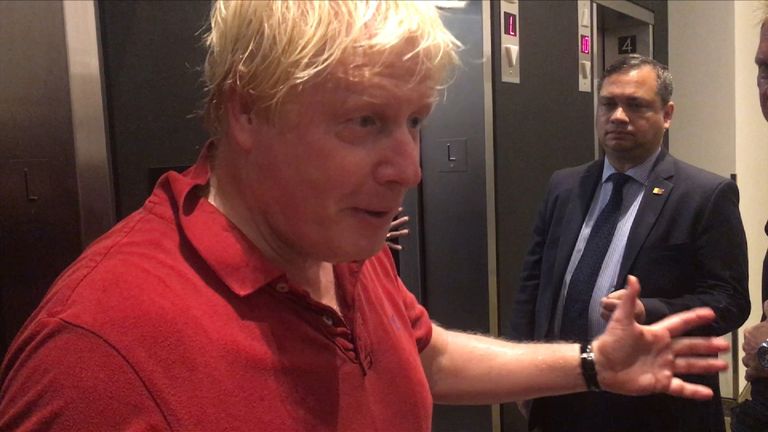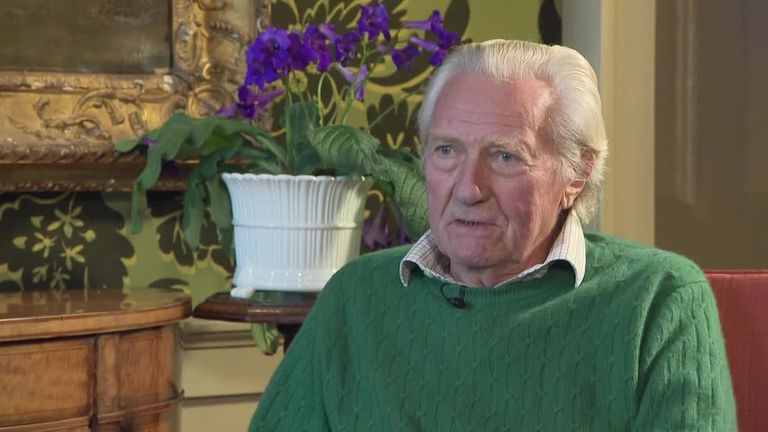Theresa May laughs off question over 'unsackable' Boris Johnson
The PM insists her Cabinet is united behind her Brexit strategy following her Florence speech, including the Foreign Secretary.
Sunday 1 October 2017 13:07, UK
Theresa May has brushed off questions about whether Boris Johnson should be sacked, after he made another high-profile intervention on Brexit aimed at forcing the Government's hand.
As the Conservatives meet in Manchester for their annual conference against a backdrop of fierce infighting, the Prime Minister insisted her Cabinet was united on both its EU negotiating strategy and domestic policy.
The Foreign Secretary, who is said to be frustrated with the direction of negotiations, followed up his 4,000-word article setting out his Brexit vision earlier this month with another intervention setting out four "red lines" for the talks.
::
They included a post-Brexit transition period lasting "not a second more" than two years; the UK refusing to accept rulings from the European Court of Justice during this period; no payments for single market access after 2021 and no shadowing of rules to keep that access.
Some Tories are furious by what they see as Mr Johnson overstepping the mark, amid newspaper reports that he believes Mrs May will be driven from office and is planning another run at the leadership.
In an interview with the BBC1's Andrew Marr Show, Mrs May simply laughed when asked if Mr Johnson was "unsackable" despite his comments, because he would be too dangerous on the backbenches - but refused to repeat her pledge in July that no Cabinet minister was unsackable.
Mrs May rejected the suggestion her authority was being undermined, saying: "What I have is a Cabinet that are united in the mission of this Government, and that's what you will see this week.
"United in the mission to build a country that works for everyone and united on the approach that we took in Florence," she added.
"Boris is absolutely behind the Florence speech and the line that we have taken."
But she equivocated on whether the European Court of Justice could have no role post-Brexit, after saying in Florence last month that rulings of the Luxembourg-based court would be taken account of in order to protect the rights of EU citizens living in Britain.
The PM refused to answer a question on whether she would resign if no deal was agreed with the European Union during a transition period after Brexit, simply saying that she was working to get a good deal.
Her key ally, First Secretary Damian Green, told ITV that Mr Johnson "has huge talents and having him in the Cabinet gives us those strengths", but said he "hoped" it would no longer seem that he was undermining the PM by the end of the Tory conference.
But Lord Heseltine, the former deputy prime minister, told Sky's Niall Paterson: "I think it's very difficult for Boris to go on making the sort of interventions he is and remain in the Government.
He added: "The whole thing is unsustainable - you cannot have a Government in which members of the Cabinet are voicing opinions which are not consistent with each other."
In a high-stakes week, Mrs May also faces ongoing fallout from the General Election, and admitted her party needed to make the case for free markets to the younger generation, following Labour's better than expected result.
Today, the PM announced a at the level of £9,250 a year, and a raise in the salary threshold at which the loans are paid back from £21,000 to £25,000 a year.
She also promised a £10bn boost for the Help to Buy housing scheme, under which eligible youngsters can access 20% of the property's value as a government-backed loan. Measures to help renters - including longer-term tenancies - are also expected to be set out on Sunday.
It is hoped the policies will arrest what party chiefs feel is an alarming decline in Conservative votes among the under-40s, after Labour offered to abolish fees altogether if they won power.
But Mrs May faces accusations that her policy pledges are simply too little too late.
Questioned on whether she was offering students "a dry biscuit, compared to Jeremy Corbyn's banquet", she said: "The point about the banquet which Jeremy Corbyn seemed to be offering is that he can't deliver it. What Jeremy Corbyn would do is wreck the economy."
Asked repeatedly if she would like to apologise for calling the General Election, Mrs May said she did not regret giving people a choice, but conceded her party's message had been wrong.
She said: "I think the key message from that election for me, one of the key messages that obviously we didn't get across was about a country that works for everyone and really wanting to build on that.
"I think we also saw from the election was that as Conservatives, the arguments that we thought we'd had and won in the 1980s about the importance of free market economies.
"We thought there was a general consensus on that and we now see that there wasn't and we now need to make those arguments again."
Discontent is rising within some sections of the party that the Conservative message is out of touch.
Sajid Javid, the Communities Secretary, told the Observer young voters who came of age during the financial crisis were sympathetic to Labour's messages about nationalising the railways and public utilities.
He said they "hear a lot of negative stuff about the banking system and markets and all of a sudden they are told nationalisation is the answer".
He added the Conservatives had spent the general election campaign "banging on about Brexit" when voters were concerned about bread and butter issues such as housing, education, transport and the NHS.







